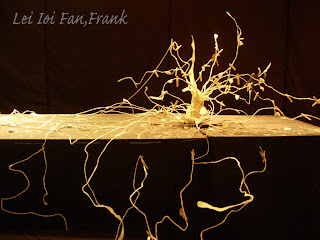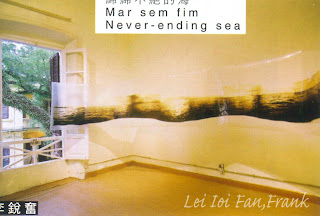Thinking Beijing in a Distance
Frank Lei
Beijing, the capital of China, is also the main site of the Olympic Game this year. But for me, today’s Beijing is still familiar but somehow foreign at the same time.
It is familiar because it is where I was born. I spent my childhood there until I left for Macau at the age of ten. Many wonderful and unforgettable memories were thus linked with this place. Coming back to visit Beijing this summer, I sought to go back to the district where my family used to live. Although the big mansion has long gone, fortunately the district where my nanny lived has not been changing too much. So that the traces of the past floating on my mind were still able to find their landing point and avoided total disappearance. Apart from that, many of my childhood playmates have also shown me with welcoming enthusiasm. As we met one another again, the friendly feeling of yesterday has emerged instantly. Even though we were all busy leading our own life, but towards an old friend like me who came from a long way, their feelings rooted from childhood were still intense and touching. But Beijing has grown indeed too big now, it was impossible to meet all of them at the same time. So I arranged to see them separately, or I have to travel some distances in order to visit them directly in their house. But there is an advantage in that; by following the same trajectory, I was able to experience what they might have felt as they moved along the development of the city. And then when we finally met, in the joy of reunion I would often observe traces of regrets. As a result of the city’s growth, old friends from former neighborhood got less and less opportunity to meet again. The more chosen option was to communicate through telephone or Internet from our own home. Very rare is occasion like this when uninvited guest such as me would suddenly appear in front of their door, so that old friends would meet in the same room again, in order to cherish the memory of the precious old times.
The closeness that I have felt from Beijing was also caused by something else. In this metropolis I seemed to have found a feeling of familiarity that was not simply because of my revisiting. This familiarity seemed to be linked with distant experiences. Yes indeed, when I was walking around art spaces such as the 798 Space or the Caochangdi Arts, I had actually felt an artistic atmosphere that seemed to exist only in foreign countries. This feeling of intimacy was because you could find and discover creative works that you prefer but was hard to find in other places of China. Familiar; because very soon you were able to meet friends who shared the same kind of ideal with you. With the same kind of language, it was easy for us to communicate and as the talking went on, you were happy to find out that art forms that were not supposed to be popular anymore elsewhere were still being insisted by certain artists in Beijing. And these cases could still find their echoes in the art scene. For instance, in the art space of Caochangdi that was near to the 798 Space, I have met a mainland photographer named Yong Yong, whose work has already been shown in Macau. Together with other friends Yong Yong has just opened a photography art centre called “Three Shadows”. The exhibition space of the photography centre was designed by the famous designer Ai Wei Wei. (who was also a famous curator, during the last Documenta in Kassel, Germany, he has brought 1001 residence from China as his art work, which was a smash hit at the time.) From the simple out shape of the building to the interior design which was full of ideas, one can feel the sincerity and persistence of the mainland photographers. Apart from the exhibition space, there were also café, photography library, studios for artists and the dark rooms. It was said that the centre would help to organize outdoor projections also. Being in this place I was attracted by dynamism motivated by much ideal. Especially after talking with Yong Yong, one could confirm about his respect and passion towards photography. He would not be influenced by the exaggerated package of the contemporary images found on the art market nowadays. He said that he would like to use the “Three Shadows Photography Centre” as a platform on which exchange and discussions could be carried out with great photographers outside China, so that China’s photography could go on to a healthy development. As I was talking with Yong Yong, I was associating the situations in Hong Kong, Macau and Taiwan. Why shouldn’t be there also a photography centre like that in these places where financial resources are not lacking? I could not help but feeling envy and ashamed. In Hong Kong, Macau and Taiwan, the conditions are actually good enough, it’s just that photography has always been seen as merely a part of the contemporary art scene. Unlike in Paris or New York, where photography is implanted as an independent art form whose diverse tendencies are worth to be introduced and collected. I hope that photography centre such as Yong Yong’s would be protected and continue to survive. If there should be a day when the contract terms were finished and the photography centre would be forced to be moved or dismantled, then it would really be a pity.
At the same time, this year, 2008’s big star city of Beijing, that will be the focus of the whole world, has become bigger and bigger far before I came. And people like me coming from a small place are feeling more and more disorientated in the big city. Maybe one would indeed need a certain time to adapt to these changes. This time of revisiting Beijing was like an adventure for me. Asking around people to know if there were interesting places to visit, I was able to experience many brand new discoveries. For instance, I went to a place called “Tianzi Hotel” and saw with my own eyes an astonishing ten-story building in the form of the three traditional Gods of Happiness, Richness and Longevity. As you entered to the building through the staircase it was as if you were entering to the “intestines” of the three lucky gods. By doing so you would experience the peculiar mentality of the Chinese peasants as saying (it was said that the hotel was invested by a group of peasants): “Now that I am living inside the belly of the three lucky gods, I would certainly become rich one day!!” Ha-ha! Superb! But what a joke at the same time! If a wish should be fulfilled so directly, there won’t be any room for imagination at all. I couldn’t help but admire the “daring” act of the investors. It was like making a plain declaration to the world about the true feelings and wish of China’s millions of peasant, “It’s really deadly cool!”
Now Beijing has truly become foreign to me and it was hard to adapt it right away. As you stepped out of the subway you would be greatly surprised by thinking that you have entered to a big city in the United States. You could not believe your eyes as you were walking with them wild opened with curiosity. Walking through these strange modern districts carefully, I seemed to find that apart from my own astonishment, all the others appeared to have accepted the scenery as perfectly normal. These people most probably were also being considered as admirable modern Beijing citizens. These were the feelings that I had when I entered for the first time in the SOHO area of the Beijing city. It told you that in fact, the so-called “Modernization” was not such a distant fact: “ Look, we Chinese could also make it so easily! No big deal about you American guys!” Although I have never been to American big cities such as New York, I have nevertheless been living in Paris for quite a while and can certainly understand how Parisians consider the American culture. No doubt they admire also the so-called Modernization trends but they are still reasonably keeping their own uniqueness. And that is why Paris still stands on its own rights, and is still attracting tourists from all over the world to pay homage. At the same time, its modern symbols are not outmoded. Either these modern architectures are incorporated into the city without destroying the traditional landscape, or they are simply organized to be built outside the city and are blended in the environment. This kind of Modernization is not just on the out shape but it carries different cultural diversities in it. La Défence situated just outside Paris is a very sound example of which the French people are proud. Then why shouldn’t the leaders in Beijing be more reasonable? Why shouldn’t they think of the traditions as treasure also?
This time before arriving at Beijing, I have been reading several books about the traditional housing (Wu Tong) of the city, trying to start the journey through a historical point of view as well as from the disappearing and the reserving process. What has impressed me the most was still the sighing tone that the authors have behind their writings. Being intellectuals, these writers must have felt their own helplessness in front of the giant’s transformation, but their conscience has nonetheless made them to record down what have been lost and is disappearing in the old Beijing. As a photographer coming from Macau, I have a lot of respect towards them and shared with them the same sentiment. As for myself, I did hope that during my short visit, I would be able to discover and experience the regret generated due to the disappearing process. I went to see several existing Wu Tong and indeed found that some of them have already become tourist and commercial areas. Some of them seemed to be keeping what was supposed to be unique of the Wu Tong style, as if trying their best to blend into the great trending of Modernization. But some other less lucky ones were just surviving in total abandonment. The residence still living in these old Wu Tong would gaze with admiration at the near by skyscrapers with elevator, thinking that one of these days they would be able to escape from the over crowded and unhygienic little houses and move into those independent apartments of the modern life. Being inside these districts that give rise to different associations of thoughts, I would try to understand these different mentalities reflected from within. One should be aware not to take on a pitiful point of view as an outsider but should keep a mild and objective angle in order to discover and record down these different feelings. I took this time’s staying in Beijing as an opportunity to reencounter, because I really did not want to wait until the Olympic Game to be part of the crowd. By then Beijing might have achieved its total transformation and turned itself into an international metropolitan, and in being so, I would find myself being further and further apart from the Beijing that I have known. When I should think of that, I just can’t help but be kind of nervous again.
遙念北京
李灌原
北京,中國的首都,又是今年奧運的主要活動場地,可於我而言現在的北京倒成了個熟悉也陌生的城市。
熟悉,是因為它是我出生和度過童年的地方,我十歲才離開這裡,許多小時候美好難忘的回憶都跟北京有關,去年再重訪,我特意回到以前住過的那個區走走看看,幸好幸好,雖說以前住過的大院子已不見了,但另一邊我的媬姆家這區仍沒怎麼變,這樣我腦海中好些昔日的足跡依舊還有個落腳之地,不致於完全消失得無影無蹤;另方面,好些我兒時的伙伴都依然熱情,大家見面了,昔日那份情誼馬上又湧現出來,盡管大家都各有各的忙碌,但對我這遠道而來的朋友,仍舊情濃不減,讓人感動,只是現在的北京變得太大了,真的沒法同時見到所有的友人,只好分批約見,或者要自己長途跋涉的去找他們,不過這也有個好處,就是同時可以直接體驗到他們在城市發展過程中所得到的感受,於是在重逢的喜悅中也能覺察到絲絲的遺憾,因為城市變大了以後,昔日伙伴相聚的機會也變得越來越少了,大家只能在各自的家中互通訊息,極難得的機會如我這類不速之客來訪時才會又共聚一堂,緬懷一下昔日的珍貴時光。
北京讓我感到親切,還因為在這大都市裡還能讓我找到到一些似曾相識的感覺,這份感覺跟舊地重遊時的感受不同,它倒和某些遙遠的經驗拉上關係,對了,當我有機會在798藝術區或草場地等地逛時,竟能感受到某種似乎只能在國外才找得到的那類藝術氣氛,那種熟悉之感是因為在這些地方你可找到或發現一些你較為喜歡的創作,可在中國其他地方卻難得一見;親切,還因為你很快就可遇到一些志同道和的朋友,大家很容易就找到一些共同的語言去交流,聊著聊著,你會高興的發現在其他地方已變得冷門的表現方式在北京仍然有人在堅持著,且能找到共鳴聲音。比如,這次在798大山地藝術區不遠處的另一個藝術交流場地草場地,我遇到一位曾來過澳門展覽的內地新一代攝影工作者榮榮,且能看到他與友人合作新開的一間私立攝影美術館“三影堂“,這間由著名設計師艾未未(這位艾未未也是名著名的策展人,去年在德國Kassel舉辦的文件大展(Documenta)上他招來了一千零一名中國居民來充當活動展品,轟動一時)設計的展館,從其外在實而不華的設計到甚有理念的內在展示理念,都讓人感受到內地一些攝影工作者們的堅持和誠意,因在這裡除了展覽區,你還可找到小咖啡室、攝影圖書館、供藝術家駐場創作的工作室和暗房等,聽說這裡還可供人辦些戶外的放映活動,處身其中我被一種甚有理想的動力吸引住,尤其在和榮榮交談後,更感到他那份對攝影的尊重與堅持,不為現今藝術市場上那類偏重浮誇包裝的影像成品影響,他說很想利用“三影堂”這個平台能與國外的攝影大師們對話及交流,從而讓中國的攝影能健康的發展下去。而我一邊和榮榮對話一邊也聯想到為什麼在港、澳、台這些資源較充足的地方就找不到這種攝影美術館,這又怎能不讓我們既羨慕也慚愧,論條件和人手,在港、澳、台其實都擁有,只是攝影一直都只依附在當代藝術的大框框裡,並未能如巴黎、紐約般能獨立自主地有計劃地自立門戶,介紹及收藏不同傾向的攝影創作,我希望像榮榮這些藝術家獨立經營的攝影館能在得到保障的氣氛下發展,不要等到有一天契約到期時被迫要拆掉或搬遷,如真有那一個天的話,那真的挺可悲的。
但與此同時,這個今年(2008年)會吸引全世界人目光的城市—北京,在我來之前,已變得越來越大,也越來越讓我這類從小地方來的普通人置身其中時會不知所措起來,可能真的要花上一段時間去接受這種轉變吧。就如這次重臨北京,我就像去探險似的,左右打聽去一些令人覺得有趣的地方,親身體驗那種種的發現:比如,我曾到過一處叫“天子大飯店”的地方,親眼目睹一處讓人驚訝的福祿壽這三大傳統福星以近十層高樓酒店形式矗立眼前,當你沿著一小樓梯鑽入三福星的‘內臟’時你會體驗到中國農民才有的獨特思維方式(聽說這間酒店是農民自費投資起的):“我現在住進了福祿壽這三仙人的肚子裡,有朝一日肯定會發達的。”哈哈,真絕!但同時又會惹人發笑,如此直接了當的心愿,不留半點引人想像的空間,不禁真的佩服那批投資者的“大膽”眼光,它實實在在的向世人宣告了中國上億農民的某種心聲,“真絕 !“
現在的北京也變得陌生或難以一下子適應了,它令你常有吃惊的發現,讓你在步出某地鐵時會被嚇了一跳,以為自己竟置身於美國的某大城市似的,你無法相信自己的眼睛,更會如鄉下人進城般的抱著好奇眼光在那些非常陌生的現代化區域裡小心翼翼地逛逛,彷似除了自己這種好奇眼光外,這裡的人都已習以為常了,甚至在那個區的那些人也成了讓人羨慕的現代北京人了。以上感受正是在下首次踏足北京SOHO區的真切感受,它讓你感受到原來所謂的‘現代化’概念也並非什麼遙不可及的事情嘛,潛在台辭是:“你瞧,咱中國人不是一樣可以輕易地就達到了嗎?你們老美有啥了不起的!”, 盡管自己尚未親身置身紐約等美國大城市,但也曾在歐洲的巴黎住上好些日子,頗能理解巴黎人是如何看待美國文化的,盡管他們也會崇尚所謂的現代化潮流,可他們仍然很理智的堅守著自己的獨到之處,故巴黎依然健在,一樣吸引世界各地的遊人來朝聖,同時它的現代化標誌也不落伍,這些現代化建築或是隱身市內卻不會破壞傳統風貌,或置身郊外,與環境相呼應;且那種現代化的腳印也不是只一種模式,它們還帶有不同的文化色彩,如巴黎郊外的La Défense區不是也挺讓法國人驕傲嗎?為什麼北京的領導們就不可以理智一點呢?他們怎麼都沒想到傳統也是寶呢。
這次赴京前,自己也曾翻閱過數本講北京胡同的書,有從歷史角度也有從消失和保存過程出發的,而讓人有深刻感受的仍是書背後那些作者們的嘆氣聲,他們身為文化人面對如此巨大的改變除了無力感外,仍會本著良心用不同方式去紀錄下那已消失或快要消失的的老北京面貌,此心情讓我這個從澳門來的攝影師十分理解和尊重,而自己也希望能在短時間的逗留中,盡量的去發現及感受一下那種消失過程的遺憾,如我這次分別去過好幾個還健在的胡同區,有的已非常的旅遊商業化了,有的似仍竭力保存著某種胡同才有的特色,算是積極在融入現代化的大潮流中,另外又有一些胡同則頗為無奈的在被人忽略的氛圍中自生自滅地生存了下來,那邊的居民每天在出入家門時會帶上羨慕的目光盯一下不遠處有電梯乘降的高樓大廈,心中盼望有一天能逃出這些擁擠不堪、衛生條件不佳的小胡同,早日搬進各自獨立的樓房裡過上現代化的生活。故自己分別置身於讓人產生不同聯想的胡同區時,也同時在學習和理解當中反映出的不同心態,提醒自己莫用過場客角度或所謂的憐憫眼光去看,盡量的保持平和、客觀的角度去發現和記下一些感受,同時自己也視為是次再認識北京的機會,自己真的不想等到奧運時來湊熱鬧,那時的北京可能已經完成了變身過程,完全成為一個國際現代化的大都市了,但也可能離我越來越遠了。想到這,真的有些心急了。









